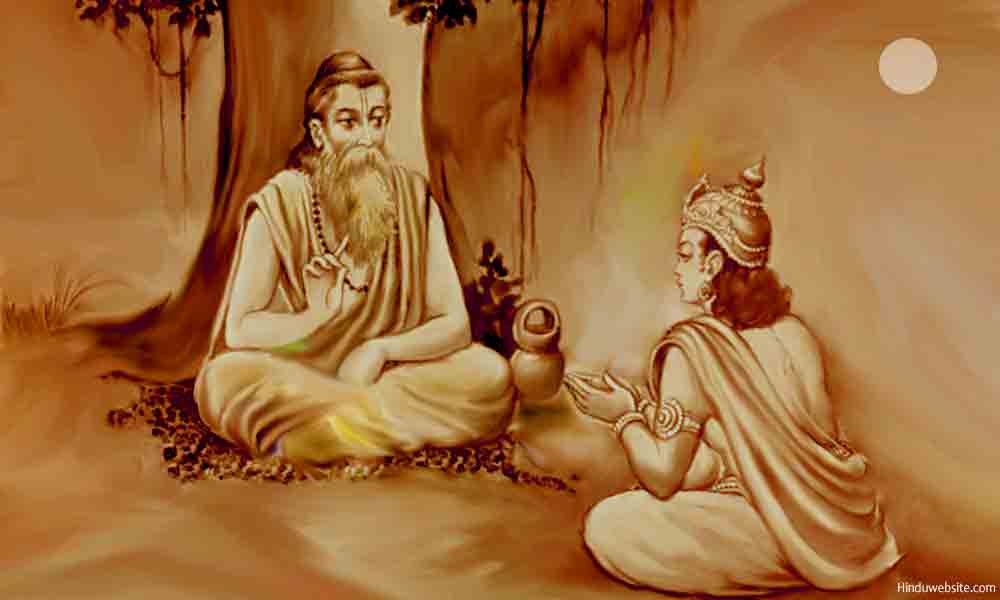
Ashtavakra Samhita, Chapter 1, Verse 18

Contents
Index, Verse 1, Verse 2, Verse 3, Verse 4, Verse 5, Verse 6, Verse 7, Verse 8, Verse 9, Verse 10, Verse 11, Verse 12, Verse 13, Verse 14, Verse 15, Verse 16, Verse 17, Verse 18, Verse 19, Verse 20
Verse 18
aaakaaram anrutham viddhi
niraakaaram thu nischalam
ethath thathvopadeshen na punarbhava sambhava
Translation
Know that the form is unreal, but the formless is permanently stable. By the instruction of this fact, rebirth becomes impossible.
Meaning
Finding stability and permanance to overcome rebirth
Anrutham means a lie, deception, or that which is false, or unreal. It is used here in reference to the body or the embodied self (jiva). The body has a specific form. It is unreal because it is a projection of the Self and does not last long. Every living being is a projection of the Self in the field of Nature. It has a beginning and an end, and it is subject to aging, sickness, decay, and death. The forms that appear in creation are like waves that rise and fall in the ocean, or the strange formations that we see in clouds or in dreams, or on a movie screen.
In contrast, the Self, about which Ashtavakra spoke in the previous two verses is formless, eternal, and constant. It does not undergo change because it is not subject to modifications even when it is caught in the cycle of births and deaths. Now how does this knowledge will end any possibility of rebirth? You may already know the answer, because the sage spoke about it before.
Until you know the truth, you cannot use discretion and decide what is good for you. Worldly people are caught in the feelings of attraction and aversion to material objects, which are impermanent and unstable in themselves. When you seek them and try to own them, you will suffer from instability and uncertainty. You may lose objects, relationships, your youth and your looks, but you cannot lose the Self, because it is you.
When you know with certainity that you are going to lose something someday why would you prefer that unless you want to experience the pain of loss? When it becomes firmly established in your mind that your name and form are impermanent, you will develop a distaste them as well as for the objects of the world. It strengthens in you the attitude of detachment and renunciation, whereby you withdraw into yourself and become more introverted and spiritual. It eventually leads to stability of the mind and absorption in the Self.
Suggestions for Further Reading
- Om, Aum, Pranava or Nada in Mantra and Yoga Traditions
- Brahmacharya or Celibacy in Hinduism
- Atheism and Materialism in Ancient India
- Solving the Hindu Caste System
- How To Choose Your Spiritual Guru?
- Creation in Hinduism As a Transformative Evolutionary Process
- Wealth and Duty in Hinduism
- Do You Have Any Plans For Your Rebirth or Reincarnation?
- Understanding Death and Impermanence
- Lessons from the Dance of Kali, the Mother Nature
- Letting your God live in You - The True Essence of the Hindu Way of Life
- prajnanam brahma - Brahman is Intelligence
- Maslow's Hierarchy Of Needs From The Perspective Of Hinduism
- The Definition and Concept of Maya in Hinduism
- The Meaning of Nirvana
- Self-knowledge, Difficulties in Knowing Yourself
- Hinduism - Sex and Gurus
- The Construction of Hinduism
- The Meaning and Significance of Heart in Hinduism
- The Origin and Significance of the Epic Mahabharata
- The True Meaning of Prakriti in Hinduism
- Three Myths about Hinduism
- What is Your Notion of God?
- Why Hinduism is a Preferred Choice for Educated Hindus
- Essays On Dharma
- Esoteric Mystic Hinduism
- Introduction to Hinduism
- Hindu Way of Life
- Essays On Karma
- Hindu Rites and Rituals
- The Origin of The Sanskrit Language
- Symbolism in Hinduism
- Essays on The Upanishads
- Concepts of Hinduism
- Essays on Atman
- Hindu Festivals
- Spiritual Practice
- Right Living
- Yoga of Sorrow
- Happiness
- Mental Health
- Concepts of Buddhism
- General Essays